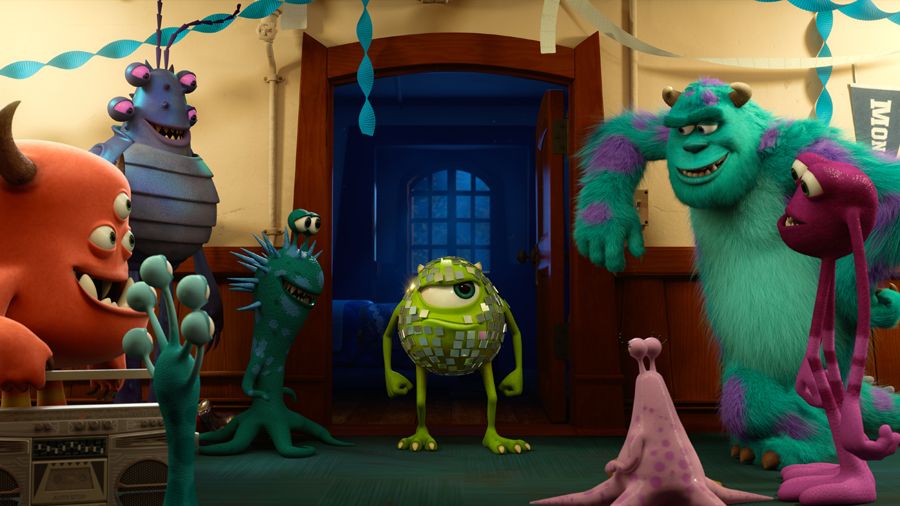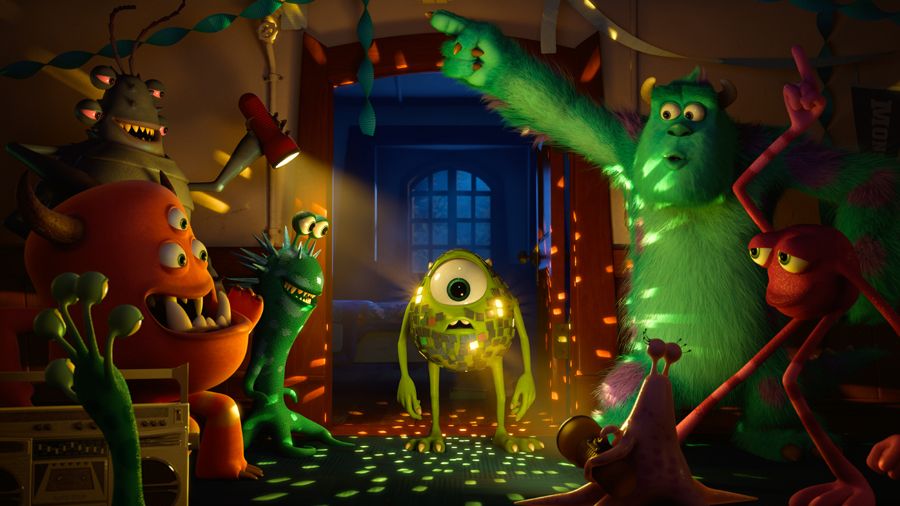Regardless of their intentions, prequels are always born under a bad sign. Not only do they automatically feel like an awkward way -- namely, backward -- to squeeze another buck out of a franchise, but they almost necessitate a story that takes the plot and themes of the original film and reduces them to their most primitive essence. By this standard, Pixar’s Monsters University is a revelation, because it manages to take the same characters audiences love, devolve them in an interesting way, and then tell a story that essentially has nothing to do with the original and yet somehow mostly reverberates with the same emotional weight.
Director Dan Scanlon, succeeding Pete Docter, manages to create the unique prequel that is at once reverent of its predecessor, breezy and engaging as a follow-up, and remarkably sophisticated in a unique way. If in fact the studio is struggling to regain its reputation as Hollywood’s top purveyor of family-friendly stories, Monsters University is a reassuring step in the right direction, in part because its fundamental message is one that Pixar might take to heart: “In discovering weakness, we’re sometimes able to find true strength.”
Billy Crystal and John Goodman reprise their roles as Mike and Sulley, this time two fresh-faced boys who encounter more than they bargain for after heading off to college. Either because or in spite of his decidedly goofy demeanor, Mike has always aspired to be one of the best scarers of all time, and he devotes endless hours understanding every aspect of the job. Sulley, on the other hand, comes from a long line of scarers, and breezes through his classes with a sense of entitlement and an abiding disinterest in the subtleties of the job. Although the two develop an immediate dislike for each another, they reluctantly team up after their rivalry gets them thrown out of the scaring program by Dean Hardscrabble (Helen Mirren). With the campus scaring competition as the only way for them to get back into that program, Mike and Sulley join a fraternity of oddballs and outcasts in the hope they will prevail, even as each begins to discover the other has strengths they both desperately need to do their best.
Although the key element that gave the first film its emotional impact -- Boo, their unofficial charge -- is here but a twinkle in the eye of one of their earliest victims, Monsters University still manages to generate amazing substance, primarily because its underlying theme isn’t just relatable but surprising. After hundreds if not thousands of movies that tell their audiences that with hard work and commitment, they will prevail against all odds, no matter what adversity they face, there’s something enormously gratifying about a story that finally admits the sad but inescapable fact that sometimes people will not achieve their dreams. And the film’s focus on Mike’s aspirations makes for an oddly realistic tale of hopes dashed rather than fulfilled, even as it simultaneously underscores that it’s sometimes in failure where we best learn how to succeed.
From the first time audiences saw Mike in Monsters, Inc., the character was always funnier than he was scary, and even as a more earnest version of that personality, he remains a strategist and planner -- a thinker, perhaps, less than a doer. Suffice it to say the film wasn’t even going to sell short his actual bona fides -- after all, the two of them do eventually become scarers -- but the unvarnished honesty with which this movie regards his dreams is sad and beautiful and recognizable to, well, anybody whose effort and dedication didn’t quite pay off.
The younger Sulley, meanwhile, falls more comfortably into a conventional character type -- a young talented guy who’s more full of himself than he deserves to be. But at the same time, taking a character that audiences love for his kindness and generosity and portraying him as a glib jerk is a risky and ambitious move, and the film pulls that off equally well. And then, it seems virtually impossible not to get exasperated with the character in his early scenes, as he coasts past Mike and his harder-working classmates with little more than volume and repetition, even if he transforms, slowly and naturally, into the softer, more thoughtful and more sensitive guy who turned from a monolith of fur into a toddler’s “kitty!” after just a few exchanges.
That said, the film’s slobs-versus-snobs dynamic that quickly emerges as Mike and Sulley make friends with the misfit fraternity brothers of Oozma Kappa is executed with little originality, and makes for an occasional distraction from the central characters’ imminently more compelling journeys. (It doesn’t help that the new characters are mostly forgettable.) But the film’s reliance on its “scare competition” for a narrative backbone unfolds with a lighter touch than one might expect, and in fact feels parallel or even subordinate to the character development that Scanlon & Co. explore during the majority of the running time. Moreover, callbacks to the first film are made at a virtually subliminal level, and even Mike and Sulley’s evolution feels untethered to the inevitability of Monsters, Inc. Conversely, their eventual nemesis Randy (Steve Buscemi) starts the film as Mike’s roommate, and his transformation from well-meaning bookworm to chest-thumping bad guy creates the film’s strongest franchise through-line, even as it provides that character with believable motivation for how and why he turned into such a jerk by the time of the original.
Although Pixar set the standard for sequels with Toy Story 2 (and 3, for that matter), it seems impossible to ask Monsters University to live up to the impact and entertainment level of Monsters, Inc., which remains one of the best and most imaginative films the studio ever made. But as most sequels -- much less prequels -- go, Scanlon’s film is pretty great, mostly because it somehow stands on its own while paying homage to its predecessor. But more than that, and notwithstanding its collegiate hijinks, it’s a really unique film whose central themes feel almost taboo in the context of most family-oriented entertainment, much less any aspirational story told in Hollywood these days.
Because not everybody is going to be able to do what they want to, just because they want to, or even because they work hard to do it. But in the discovering the boundaries of your dreams, and learning what you can’t do, a person -- or, sure, a studio -- can figure out that they are capable of other, different, possibly even better things. Ultimately, it’s up to their detractors -- and fans -- to determine what synergy exists between Mike’s eventual realization and Pixar’s, but it’s precisely in acknowledging the possibility of failure, no matter how noble are your ambitions, that enables Monsters University to truly succeed.
Monsters University opens today nationwide.



